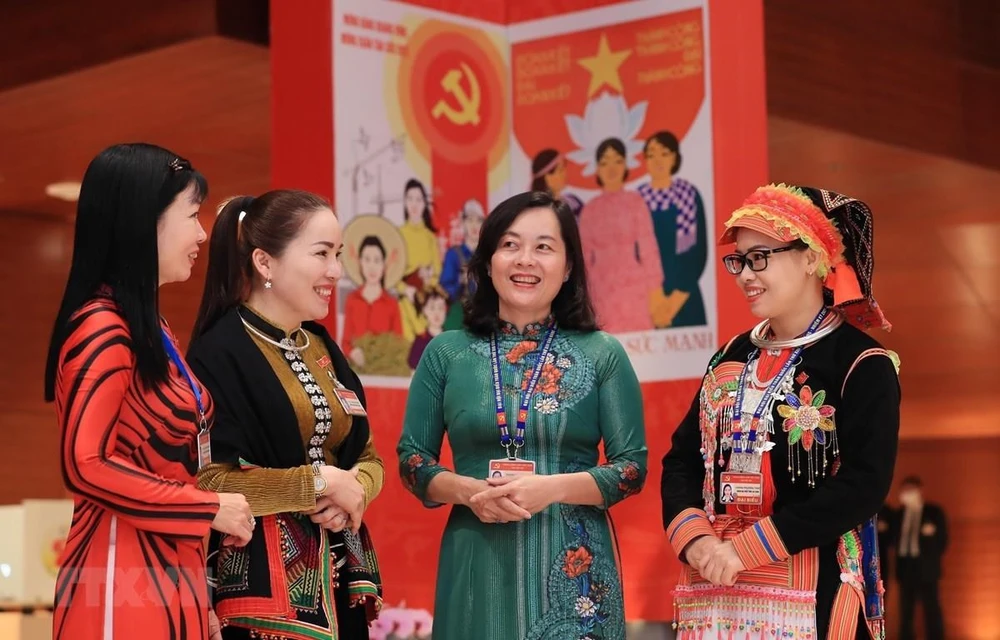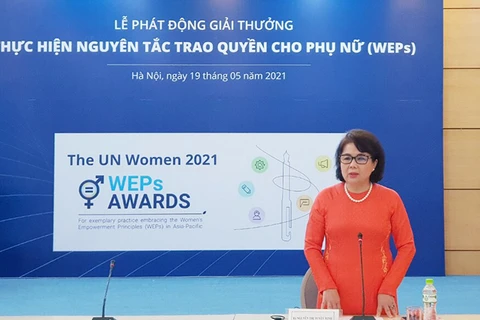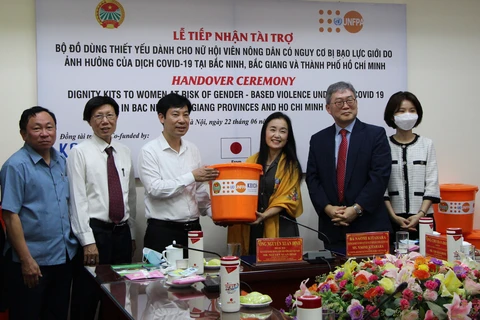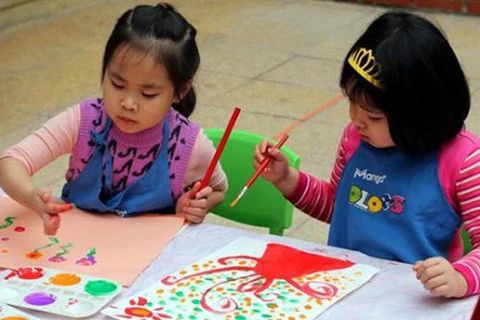
Hanoi (VNA) – Vietnam should make targeted investments in changing social norms towards advancing gender equality, heard a virtual conference on the Final Review of the National Strategy on Gender Equality (NSGE) in 2011-2020 and Implementation of the NSGE for the 2021-2030 period.
The event was held by the Ministry of Labour, Invalids and Social Affairs (MoLISA) in coordination with the United Nations Entity for Gender Equality and the Empowerment of Women (UN Women) and the Australian Embassy in Vietnam on August 12.
According to the findings of the Labour Force Survey in 2019, women’s time spent on doing housework was 2.1 times higher than that of men. Specifically, on a weekly basis, women spent nearly 39 hours a week for paid labour and production and 18.9 hours for unpaid housework, while men spent 40 hours on paid labour and production and 8.9 hours in unpaid housework.
The NSGE 2021-2030 targets to shorten the women’s time gap in doing unpaid housework to 1.7 times by 2025 and 1.4 times by 2030 compared to that of men. It also aims to increase the proportion of women who hold wage-paying jobs to 50 percent by 2025 and around 60 percent by 2030, and reduce the rate of those working in the agricultural sector to below 30 percent by 2025 and less than 25 percent by 2030.
From 2011-2019, 169,946 people received counselling, support and were taken care of as survivors of domestic violence.
The country sets a target for 80 percent of women suffering from domestic and gender-based violence to be given access to at least one of basic support services, and the figure is expected to reach 90 percent by 2030.
According to the findings of the National Study on Violence against Women in Vietnam in 2019, violence against women has decreased: physical violence went down from 31.5 percent in 2010 to 26.1 percent in 2019 and emotional violence decreased from 53.6 percent in 2010 to 47.0 percent in 2019. However, sexual violence tended to increase.
Up to 90.4 percent of women who experienced physical and/or sexual violence by a husband/partner did not seek help from a formal service. Less than 1 percent reported seeking help from a shelter. A 2015 study also revealed that the majority of women who experienced domestic violence did not seek help from any agency or organization.
In addition to several targets whose outcomes obtained from the previous period should be sustained, the NSGE 2021-2030 also includes novel targets such as: increasing the number of public social assistance establishments that carry out the activities to support, prevent and respond to gender-based violence; reducing adolescent birth rates; introducing health facilities providing pilot health care services for LGBT people; incorporating contents on gender and gender equality in the curricula of the national education system.
With a view to facilitating the NSGE 2021-2030 implementation, the MoLISA has developed a guide to data collection and reporting on the NSGE implementation results to aid key ministries, sectors and localities in the synchronous and consistent collection of data and reporting on the NSGE performance annually, towards ensuring the effective and timely monitoring and evaluation of NSGE performance.
“Thanks to the efforts made by the whole political system, after 10-years of implementation of the NSGE, we have obtained numerous encouraging results, contributing to narrowing gender gaps in all spheres, thereby making positive contributions to the socio-economic development process of the country,” Deputy Minister of Labour, Invalids and Social Affairs Nguyen Thi Ha said in her remarks at the event. “These gains will be a solid foundation for all levels and sectors to sustain and advance further in materializing national objectives on gender equality in the upcoming period.”
“The review on the NSGE implementation over the past 10 years has indicated the need to ensure financial resources for gender equality, especially through investment expenditure sourced from the state budget for adequate funding to realize the NSGE objectives,” said Elisa Fernandez Saenz, Representative of UN Women in Vietnam which provides technical assistance to the formation of the NSGE 2021-2030.
“To do so, it is necessary to ensure that NSGE objectives will be properly mainstreamed in sectoral and local plans, as well as in national target programmes. Vietnam is also advised to make targeted investments in changing social norms towards advancing gender equality, which has been the core element to promote gender equality experienced by a large number of countries worldwide and has also constitutes the very primary goal of NSGE 2021-2030.”
Robyn Mudie, Australian Ambassador to Vietnam, said: “There are opportunities and challenges for the advancement of women and girls in the coming decade, including on issues related to Vietnam’s ageing population, Revolution 4.0 and the automation of jobs.”
“The strategy’s guidance and recommendations lay the foundations for strong policy approaches to these issues, while also supporting the critical role of women in the economy and women in leadership.”/.
























